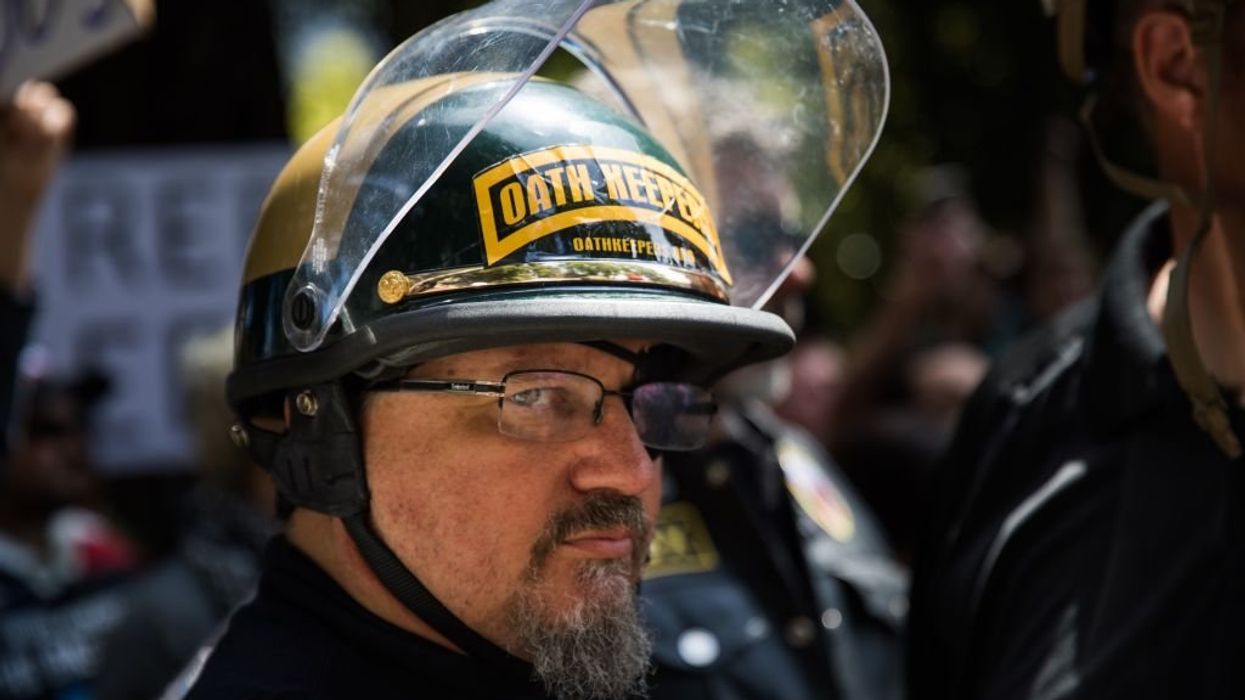© 2024 Blaze Media LLC. All rights reserved.
"By and large, people didn't show up."
WASHINGTON (AP) -- A drop in voter turnout in Tuesday's election didn't keep President Barack Obama from winning a second term in the White House.
Preliminary figures suggest fewer people voted this year than four years ago, when voters shattered turnout records as they elected Obama to his first term.
In most states, the numbers are shaping up to be even lower than in 2004, said Curtis Gans, the director of American University's Center for the Study of the American Electorate. Still, the full picture may not be known for weeks, because much of the counting takes place after Election Day.
"By and large, people didn't show up," Gans said.
 An American supporter of President Barack Obama holds a flag and sports a T-shirt which has a portrait of Obama and a phrase that reads 'Bangalore has hope' during a screening of U.S. elections coverage organized at a restaurant over breakfast in Bangalore, India, Wednesday, Nov. 7, 2012. Obama captured a second White House term, blunting a mighty challenge by Republican Mitt Romney as Americans voted for a leader they knew over a wealthy businessman they did not. Credit: AP
An American supporter of President Barack Obama holds a flag and sports a T-shirt which has a portrait of Obama and a phrase that reads 'Bangalore has hope' during a screening of U.S. elections coverage organized at a restaurant over breakfast in Bangalore, India, Wednesday, Nov. 7, 2012. Obama captured a second White House term, blunting a mighty challenge by Republican Mitt Romney as Americans voted for a leader they knew over a wealthy businessman they did not. Credit: AP
In Texas, turnout for the presidential race dropped almost 11 percent from 2008. Vermont and South Carolina saw declines that were almost as large. The drop-off was more than 7 percent in Maryland, where voters approved a ballot measure allowing gay marriage.
With 95 percent of precincts reporting, The Associated Press figures showed more than 117 million people had voted in the White House race, but that number will go up as more votes are counted. In 2008, 131 million people voted, according to the Federal Election Commission.
Experts calculate turnout in different ways based on who they consider eligible voters. A separate, preliminary estimate from George Mason University's Michael McDonald put the 2012 turnout rate at 60 percent of eligible voters. That figure was expected to be revised as more precincts reported and absentee votes were counted.
The biggest plunge by far, according to the American University analysis, came in Eastern Seaboard states still reeling from the devastation from Superstorm Sandy, which wiped out power for millions and disrupted usual voting routines. Fifteen percent fewer voters cast ballots in New York this year than in 2008. In New Jersey, it was almost 12 percent. The gap in New Jersey could narrow in the coming days because elections officials have given displaced residents in some areas until Friday to cast special email ballots.
Best efforts be darned, making it to the polls in the wake of Sandy may have simply been too much for some affected voters. In Hoboken, N.J., Anthony Morrone said he's never missed a vote - until now.
 US President Barack Obama and family arrive on stage after winning the 2012 US presidential election in Chicago November 7, 2012. Obama swept to re-election, forging history again by defying the dragging economic recovery and high unemployment which haunted his first term to beat Republican Mitt Romney. Credit: AFP/Getty Images
US President Barack Obama and family arrive on stage after winning the 2012 US presidential election in Chicago November 7, 2012. Obama swept to re-election, forging history again by defying the dragging economic recovery and high unemployment which haunted his first term to beat Republican Mitt Romney. Credit: AFP/Getty Images
"No time, no time to vote, too much to do," said Morrone, 76, as he surveyed the exterior of his home: a pile of junked refrigerators, a car destroyed by flooding and a curbside mountain of waterlogged debris.
In other areas not affected by the storm, a host of factors could have contributed to waning voter enthusiasm, Gans said. The 2012 race was one of the nastiest in recent memory, leaving many voters feeling turned off. With Democrats weary from a difficult four years and Republicans splintered by a divisive primary, neither party was particularly enthused about their own candidate. Stricter voting restrictions adopted by many states may also have kept some voters away from the polls.
"Beyond the people with passion, we have a disengaged electorate," Gans said. "This was a very tight race, there were serious things to be decided."
Decided they were - by the millions of voters who, in many cases, braved all kinds of inconveniences to make sure their voices were heard.
Some voters in South Carolina's Richland County waited more than four hours to cast their votes, and leaders from both parties blamed the delays on broken voting machines. Officials in Virginia and New Hampshire reported many voters were still waiting to vote when polls closed in the evening. In major battleground states like Ohio and Florida, lines snaked back and forth as voters waited patiently to cast their ballots.
"I've been waiting for four years to cast this vote," said Robert Dan Perry, 64, as he cast his vote for Romney in Zebulon, N.C.
Both Obama and Republican Mitt Romney made voter turnout a top priority in the waning days of an intensely close race. But for months leading up to Election Day, both candidates were obsessed with that tiny sliver of undecided voters.
It may be that those who were still undecided Tuesday decided just not to show up, said Kyle Kondik, a political analyst at the University of Virginia's Center for Politics.
"Everyone was talking about how the Democrats are unenthusiastic and the Republicans are fired up," Kondik said. "It sounds like that was all talk."
One bright spot in this year's voting was the number of early and mail-in ballots cast. Before polls opened on Election Day, more than 32 million people had voted, either by mail or in person, in 34 states and the District of Columbia. In a number of states, including Iowa, Maryland and Montana, early voting appeared to far exceed totals from 2008.
Want to leave a tip?
We answer to you. Help keep our content free of advertisers and big tech censorship by leaving a tip today.
Want to join the conversation?
Already a subscriber?
Billy Hallowell is a digital TV host and interviewer for Faithwire and CBN News and the co-host of CBN’s "Quick Start Podcast."
Billy Hallowell
Billy Hallowell is a digital TV host and interviewer for Faithwire and CBN News and the co-host of CBN’s "Quick Start Podcast."
more stories
Sign up for the Blaze newsletter
By signing up, you agree to our Privacy Policy and Terms of Use, and agree to receive content that may sometimes include advertisements. You may opt out at any time.
© 2024 Blaze Media LLC. All rights reserved.
Get the stories that matter most delivered directly to your inbox.
By signing up, you agree to our Privacy Policy and Terms of Use, and agree to receive content that may sometimes include advertisements. You may opt out at any time.


